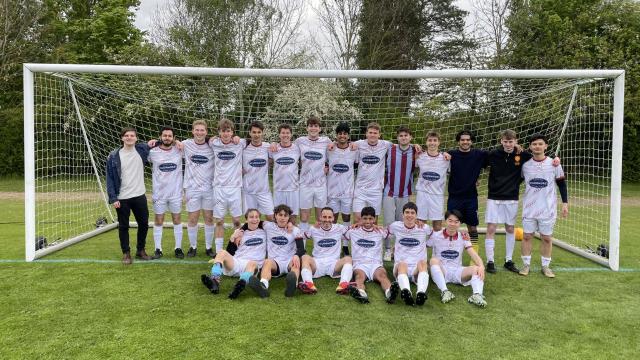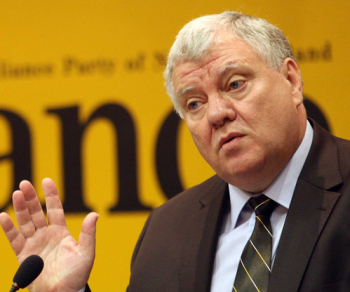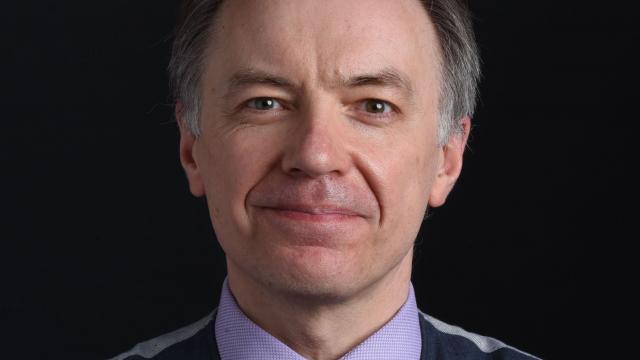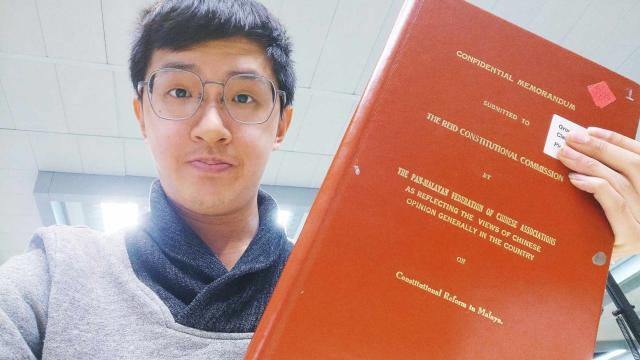
Northern Ireland needs a version update
John Cushnahan has held public office on both sides of the Irish border, as an MLA, leader of the Alliance Party (1984-7) and a Fine Gael MEP from 1989-2004. He talks to the IoI team about changing the Good Friday Agreement and designing the framework for a future border poll. What is missing or outdated in the Agreement? How can we make Stormont work? What more is needed for post-Troubles reconciliation? And how can a border poll avoid the pitfalls of Brexit?
Scroll on to discover
- Executive summary
- About the speaker
- Watch the conversation
- What was said?
Executive summary
- Cushnahan commends the Good Friday Agreement as a “historic achievement”. We are “indebted to its architects”. However, “complacency then set in” shortly after ratification, and we began to “deceive ourselves about what was happening”. It instituted no bill of rights, no major process of post-conflict reconciliation, and “totally insufficient progress” on integration in housing and education. Its largest failure is the “inability to deliver stable political isntitutions”.The GFA should not be discarded, but needs reviewing and “corrective decisions” to “implement what was intended in 1998”.
- The power-sharing system established by the 2006 St Andrew's Agreement, in which the largest party in the Assembly takes the First Minister role, and the largest party from the other tradition takes the Deputy First Ministership, has led voters to coalesce around the largest party from their community. This has produced centrifugal tendencies in Northern Irish politics, benefiting Sinn Féin and the DUP at the expense of the political centre, and failing to produce working executives. Cushnahan proposes replacing this system with governing coalitions of parties, requiring two thirds of the Assembly’s backing, “cross-community support” and sharing of first ministers.
- There is still no “equality of respect” for the nationalist and unionist traditions, and “supporters of the violent campaigns of republican and loyalist terrorist organisations continue to glorify their actions, and continue to inflict suffering and pain on the families of their victims, denying them closure”. He calls for public apologies from those who perpetrated and supported paramilitary violence, greater efforts on integrated housing and education, action plans to remove peace walls (the “greatest misnomer”, actually entrenching division), and more reciprocal, mutual respect, criticising for instance Sinn Féin’s veto of a monument to commemorate the Northern Ireland Centenary at Stormont.
- In the case of a border poll, Cushnahan wants to avoid the pitfalls of Brexit, where voters had minimal information on the realistic options and consequences after a Leave victory. He calls for the British and Irish governments to fund a multi-university research project, to explore in detail the options for Irish unification. This work should examine different state models for a united Ireland – a “unitary, federal or confederal” state – as well as possible “legislative and structural changes”, options for protecting minority rights, “government culture and citizenship”, and how contingencies such as Scottish independence would affect unification. This research would provide “detailed analysis”, without recommending a particular course of action. The ultimate decision would lie with the electorate, but they should be as well informed as possible.
About the speaker
John Cushnahan is a former student Civil Rights activist and General Secretary of the Alliance Party (1974-82) when he was the party’s only full-time politician. John was a Councillor for North Belfast 1977-85 and in 1982, was elected as Member of the Northern Ireland Assembly for the staunchly unionist constituency of North Down. John was appointed Chairman of the Assembly Education Committee and was Alliance Party Chief Whip (1982-4 ) and party leader 1984-7. When the Unionist parties used the Assembly's procedures to oppose the Anglo-Irish Agreement, in December 1985, John called on the British Government to dissolve the Assembly. This terminated his income as a full-time politician. Despite this, he led the Alliance Party into the June 1987 Westminster Election where the party doubled its share of the vote from 5-10% (this tally was not exceeded until 2019). He retired as Alliance Leader in September 1987. In 1989, he was invited by Fine Gael to contest the European Parliament (EP) election in the strongly nationalist Munster constituency. After being re-elected twice, he retired in 2004. During this period, John was elected Vice President of the EP Regional Policy and Foreign Affairs Committees and was EP rapporteur on Interreg, Hong Kong, Sri Lanka, Pakistan and Kashmir. John was also appointed by the EU Council as Head of Mission to lead multi-national and multi-disciplinary teams in South Asia on five occasions, the objective of which was to strengthen Democracy and Human Rights in the region.
Watch the conversation
What was said?
The Good Friday Agreement was a “historic achievement”, says John Cushnahan, but it has fallen far short of its aspirations. After the Agreement was ratified, “complacency then set in”, and we began to “deceive ourselves about what was happening”. Cushnahan paints a bleak picture of the peace process and democracy’s success in post-conflict Northern Ireland. There is no bill of rights, no “equality of respect” for the Unionist and Nationalist traditions, and “totally insufficient progress” on integration in education and housing. The “supporters of the violent campaigns of Republican and Loyalist terrorist organisations continue to glorify their actions, and continue to inflict suffering and pain on the families of their victims, denying them closure”. The biggest failure for Cushnahan, however, is the “inability to deliver stable political institutions”. He notes how the Stormont Executive has collapsed at least six times since 1999 (nine according some academics), and hasn’t sat for ten out of twenty two years since power-sharing was installed. But Cushnahan is still convinced and determined that the Good Friday Agreement can be amended to finally meet aspirations.
John Cushnahan was born in 1948 to a working-class Catholic family in the lower Falls, Belfast. He was involved in student civil rights activism before entering elected politics. He became General Secretary of the Alliance Party in 1974, at the time the party’s only full time employee, and sat on the Belfast City Council from 1977-85. He served as Alliance Party leader from 1984-7, a difficult period in which Alliance backed the Anglo-Irish Agreement against concerted Unionist opposition. When Unionists blocked the Agreement, which would give the Irish Republic a consultative role in governing Northern Ireland, Cushnahan called on the British Government to prorogue Stormont. Stormont was dissolved in 1986, and Cushnahan soon after resigned his position in Alliance and moved to the Republic. Joining Fine Gael, he served as a member of the European Parliament from 1989-2004. Barry Colfer commends him for having “done more than most to build bridges North-South and East-West in British and Irish politics”. Long retired from elected office, Cushnahan is still deeply engaged with politics, brimming with analysis and suggestions.
“I don’t think that we should just discard the Good Friday Agreement”, Cushnahan says. We should “review it, see where it’s defective and make corrective decisions”. He particularly wants revisions to the power-sharing system established by Good Friday and the subsequent St Andrew's Agreement (2006), in which the largest party in the Assembly takes the First Minister role, and the largest party from the other tradition takes the Deputy First Ministership. Cushnahan argues that this system has led voters to coalesce around the largest party from their community – Sinn Féin and the DUP. These centrifugal tendencies have weakened the political centre in Northern Ireland – the UUP, Alliance and SDLP – and have failed to produce working executives. Cushnahan proposes replacing this system with governing coalitions of parties, requiring two thirds of the Assembly’s backing, “cross-community support” and sharing of the first minister roles.
Cushnahan also wants greater efforts towards reconciliation, to meet the unfulfilled aspirations of Good Friday. Audience member, former Alliance Chairman, Phillip McGarry, asks whether Sinn Féin’s “unapologetic” defence of IRA violence serves to “undermine” reconciliation, while Fergal McCarthy enquires about possible policies for reconciliation? Cushnahan offers some solutions. He calls for a roadmap to remove the “peace walls” in cities such as Belfast – they are the “greatest misnomer”, and only entrench segregation. He also calls for greater efforts at integrating education and housing. With regards to housing, he suggests removing all paramilitary murals as a productive first step. Cushnahan is scathing about all attempts to defend paramilitary violence. “How can anyone expect reconciliation in Northern Ireland when paramilitaries on both sides continue to glorify their actions?” They should publicly apologise and commit to peaceful, democratic methods in future. Apologies would “give some comfort to the 3000 families whose relatives were slaughtered in the Troubles. And that would be an important psychological first step.”
Cushnahan also addresses the framework for a border poll. Noting the ambiguities of the Good Friday Agreement and the subsequent Northern Ireland Act of 1998 on how a poll should be initiated, Cushnahan argues that two thirds of Assembly votes should be required to schedule one. If a poll is scheduled, Cushnahan is determined to avoid the pitfalls of the Brexit referendum, where voters had minimal information on the realistic consequences of a Leave vote. He criticises Sinn Féin’s campaigns for reunification as “sloganizing” and insubstantial, and draws parallels between the party and Boris Johnson’s Tories – both are “cynically exploiting narrow nationalisms for electoral advantage”.
Cushnahan wants voters to be as informed as possible before a border poll, and calls for the British and Irish governments to fund multi-university research projects with “detailed analysis of the options” for Irish unification. This research, “coordinated under a single organisational umbrella”, would explore diverse aspects of unification. It would cover potential state models (unitary, federal and confederal), “legislative and structural changes”, options for protecting minority rights, government and citizenship in a united Ireland, and the effects of “possible shocks” such as Scottish independence. Publishing this research should “inform the public and encourage a constructive and ongoing debate well in advance of any border poll”.
However, Cushnahan doesn’t believe that there’s “any possibility in the near future of an all-Ireland settlement.” So, in the meantime, we have to try and make Stormont work. “If we can’t unite Northern Ireland, how the hell can we unite Ireland?" A question which will inevitably be asked again in this series and as the political fallout from Brexit continues to animate these islands.




